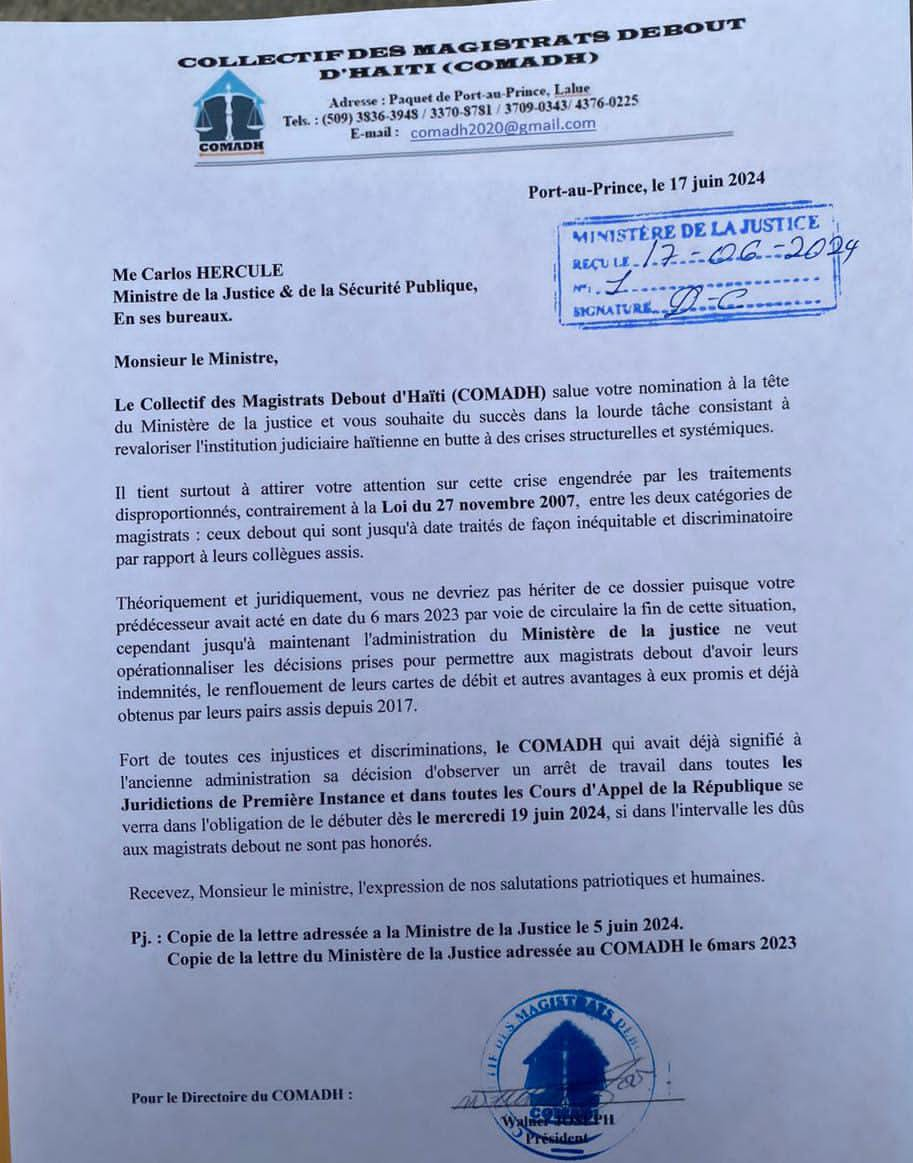Of the 24 investigating judges needed in Port-au-Prince, only 3 are currently serving their mandate
Attorney Frantz Gabriel Nerette lost his entire portfolio of real estate clients, causing a loss of “five to seven thousand US dollars” per year.
In March, Maître Rose-Berthe Augustin temporarily closed his practice and moved his files to a “secure” location.
Dozens of other lawyers in Port-au-Prince are losing clients every month in a context of the near paralysis of the judicial system, due to insecurity and structural problems.
“It’s a dying profession,” says Me Samuel Madistin to AyiboPost, a leading attorney who also reports having lost several clients.
Dozens of other lawyers in Port-au-Prince are losing clients every month in a context of the near paralysis of the judicial system, due to insecurity and structural problems.
Already ailing, the courts are hardly functional in the Port-au-Prince jurisdiction since the last armed gang assault on February 29, 2024.
The start of the 2023-2024 judicial year was marked by the socio-political crisis, [dubbed] “country lockdown,” followed by days of repeated protests against Ariel Henry’s government.
The judicial system functions with difficulty outside the capital.
But dysfunction reached these areas following the start of a strike by government commissioners last week.

Letter from the « Collectif des Magistrats Debout d’Haïti » addressed to the Minister of Justice and Public Security, Me Carlos Hercules.
These dysfunctions are not new.
Read also: Short of clients, lawyers flee the profession and close their offices
The new government must restore security and then focus on resuming judicial activities. This is what Judge Marthel Jean Claude, President of the Professional Association of Magistrates, recommends.
“Justice is at a standstill in the jurisdictions of Port-au-Prince and Croix-des-Bouquets,” notes the magistrate. Of the 24 investigating judges needed in Port-au-Prince, only three – Jean Wilner Morin, Merlan Belabre and Judge Jameson Simon – are currently serving their mandate.
The paralysis of the courts prevents compliance with the deadlines set by law for processing a case, leaving lawyers at risk of losing their cases.
The situation also creates a barrier to access to justice, exacerbating prolonged pre-trial detention – a national scourge.
Read also: Minors, girls and prisoners from National Penitentiary forced into shared detention
83.92% of the 11,837 inmates in the prison population are awaiting trial, according to a report from the National Network for the Defense of Human Rights (RNDDH) published on October 11, 2023.
Some prisoners have been awaiting trial for more than a decade, in violation of Haitian laws and international conventions.
“Since July 2018, there have been no jury-assisted criminal trials in the Port-au-Prince jurisdiction,” notes Me Samuel Madistin.
Of the 18 first instance courts in the country, only those of Jérémie and Hinche have each organized a criminal trial assisted by a jury for the 2022-2023 judicial year, according to the RNDDH report.
The government commissioner at the court of first instance of Port-au-Prince, Me Edler Guillaume, did not respond to interview requests from AyiboPost.
“When a tenant tells me that he will pay me in two or three months, I have no leverage,” Attorney Frantz Gabriel Nerette told AyiboPost. “Even if I send him a summons,” continues the university professor, “the client knows that I will not be able to summon him to appear in court because he is aware that the courts are not operational.”
Cover image: A professional in a law firm.| © Istock
Watch this AyiboPost report published in November 2019 on the problem of prolonged preventive detention in Haiti:
Keep in touch with AyiboPost via:
► Our channel Telegram : Click here
► Our Channel WhatsApp : Click here
► Our Community WhatsApp : Click here







Comments